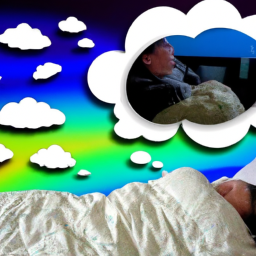Every morning, I wake up feeling exhausted and drained, as if I have carried the weight of the world on my shoulders while I slept. This has been a recurring pattern for a while now. I can’t help but question, why do these sorrowful dreams continue to haunt me?
On one hand, it’s a relief to know that I’m not alone in this experience. Many people have reported having sad dreams that leave them feeling emotionally drained and overwhelmed. On the other hand, it’s frustrating to not understand why this is happening and how to stop it.
In this article, I’ll explore some possible reasons why we have sad dreams and what we can do to alleviate them.
Key Takeaways
- Sad dreams are a common experience that can cause emotional drain and overwhelm, and may be a manifestation of underlying stress and anxiety.
- Sleep disorders, medications, and technology use before bed can disrupt normal sleep patterns and contribute to emotionally charged dreams.
- Lifestyle choices such as diet and exercise can improve mood and reduce the frequency of sad dreams, while sleep disruptions and high anxiety levels can lead to more intense nightmares.
- Seeking therapy or counseling, keeping a dream journal, and seeking professional help from a dream analysis specialist may be necessary to address unresolved emotional issues contributing to sad dreams.
The Common Experience of Sad Dreams
You’re not alone if you’ve been having sad dreams – it’s a common experience.
Many people have reported having dreams that leave them feeling sad, anxious, or depressed upon waking up. These dreams can range from mild sadness to intense emotional distress that lingers throughout the day.
It’s important to note that sadness in dreams may not always be directly related to the events taking place in the dream. Rather, it may be a manifestation of underlying stress and anxiety that we’re experiencing in our waking lives.
This brings us to the next point about stress and anxiety as a possible factor.
Stress and Anxiety as a Possible Factor
Feeling stressed and anxious can contribute to experiencing more emotionally charged dreams, such as those with negative emotions like sadness or fear. In fact, studies show that individuals with high levels of anxiety report more frequent and intense nightmares compared to those with lower anxiety levels.
When we experience heightened levels of stress and anxiety in our waking lives, it can often spill over into our subconscious minds during sleep, leading to an increase in the frequency of sad dreams. There are several ways that stress and anxiety may contribute to the frequency of sad dreams, including:
- Increased activation of the amygdala, the part of the brain responsible for processing emotions, leading to a higher likelihood of negative emotional content in dreams
- Disruptions in sleep, such as sleep disturbances or waking up frequently during the night, leading to more vivid and memorable dreams
- Heightened levels of cortisol, the stress hormone, which can impact the content and emotional tone of dreams
- Increased rumination on negative thoughts and emotions throughout the day, which can carry over into dream content during sleep.
As we explore the possible factors contributing to sad dreams, it’s important to note that unresolved emotional issues may also play a role.
Unresolved Emotional Issues as a Possible Factor
If you’ve been avoiding or suppressing unresolved emotional issues in your waking life, it’s possible that they may be manifesting in your dreams as sadness or other negative emotions. Perhaps there are certain events or people that you haven’t fully processed or dealt with, and they continue to haunt you in your subconscious.
It can be difficult to confront these issues, but doing so may help alleviate some of the sadness in your dreams and improve your overall well-being. Additionally, seeking therapy or counseling can be a helpful step in addressing these emotional issues.
A therapist can provide a safe and supportive environment to explore and process these feelings, and can offer tools and techniques to cope with them. However, if the sadness in your dreams persists even after addressing these emotional issues, it may be worth considering other possible factors such as sleep disorders or medication use.
Sleep Disorders and Medications as Possible Factors
I’ve been curious about why I keep having sad dreams. After doing some research, I found out that sleep disorders and medications can possibly be factors.
It turns out that there is a relationship between dreams and sleep disorders, and some medications can also affect our dreams.
The Relationship between Dreams and Sleep Disorders
You may be interested to know that according to a study by the National Sleep Foundation, individuals with sleep disorders are more likely to experience frequent and intense dreams. This is because sleep disorders like insomnia, sleep apnea, and restless leg syndrome disrupt the normal sleep cycle, causing the brain to enter REM sleep more frequently and for longer periods of time. As a result, dreams become more vivid and intense, and individuals may wake up feeling exhausted and emotionally drained.
If you’re experiencing sad dreams, it’s possible that you may have an underlying sleep disorder that needs to be addressed. Here are some common sleep disorders that may be contributing to your sad dreams:
-
Insomnia: difficulty falling or staying asleep, leading to fragmented sleep and frequent awakenings throughout the night
-
Sleep apnea: pauses in breathing during sleep, leading to disruptions in the normal sleep cycle and a decrease in the amount of restorative deep sleep
-
Restless leg syndrome: an uncomfortable sensation in the legs that occurs at night, leading to difficulty falling asleep and frequent awakenings
Understanding the relationship between sleep disorders and dreams can help you identify the root cause of your sad dreams and take steps to address it. However, it’s also important to note that some medications can also have an impact on dreaming.
The Effects of Some Medications on Dreaming
After researching the relationship between dreams and sleep disorders, I started to wonder about the effects of medication on dreaming. It turns out that some medications can have a significant impact on our dreams.
For example, antidepressants like Prozac and Zoloft are known to cause vivid and intense dreams. On the other hand, medications like beta-blockers, which are used to treat high blood pressure, can actually suppress dreams altogether.
One theory is that these medications affect the neurotransmitters in our brains that are responsible for regulating our sleep and dreaming cycles. While the exact mechanisms are still being studied, it’s clear that medication can play a role in the content and intensity of our dreams.
But medication isn’t the only factor that can influence our dreams. The role of diet and lifestyle choices is also important to consider.
With this in mind, let’s take a closer look at how our daily habits and choices can impact our dreams.
The Role of Diet and Lifestyle Choices
By making better diet and lifestyle choices, you can improve your overall mood and potentially reduce the frequency of sad dreams. Here are some tips that can help you in this regard:
- Avoid consuming caffeine, alcohol, and nicotine before bedtime.
- Eat a healthy and balanced diet that includes fruits, vegetables, whole grains, and lean proteins.
- Exercise regularly to release endorphins that can boost your mood and reduce stress.
- Practice relaxation techniques like meditation, deep breathing, or yoga before bedtime to calm your mind and reduce anxiety.
- Get enough sleep by sticking to a regular sleep schedule and avoiding electronic devices before bedtime.
By incorporating these tips into your daily routine, you can improve your overall well-being and potentially reduce the frequency of sad dreams.
However, it’s not just diet and lifestyle choices that can affect your dreams. The next section will explore the effects of technology and screen time on dreaming.
The Effects of Technology and Screen Time
I’ve noticed that my screen time has been increasing lately, and it’s been affecting my sleep and even my dreams.
That’s why I wanted to discuss the effects of technology use on our sleep and dreaming patterns.
I’ll also be sharing some tips on reducing screen time before bed to help improve our overall sleep quality.
How Technology Use Affects Sleep and Dreaming
You’re likely tossing and turning due to the blue light emitted from your phone, which can metaphorically trap your mind in a dark and restless cycle of sad dreams. The blue light tricks your brain into thinking it’s still daytime, suppressing the production of the sleep hormone melatonin, and delaying your body’s natural sleep-wake cycle. This can result in poor quality sleep and frequent awakenings, leading to an increase in the frequency and intensity of sad dreams.
To avoid this, it’s important to limit screen time before bed. But, it can be challenging to break the habit of scrolling through social media or watching TV in bed.
In the next section, I’ll provide tips on how to reduce screen time before bed and improve the quality of your sleep and dreams.
Tips for Reducing Screen Time Before Bed
To reduce the negative effects of blue light on your sleep and dreaming, try implementing these simple tips for limiting screen time before bed. First, set a digital curfew for yourself at least an hour before bedtime. This means turning off all electronics including televisions, computers, tablets, and smartphones. Instead, opt for a relaxing activity such as reading a book, taking a bath, or meditating.
Second, adjust the brightness of your screens to a warmer, dimmer setting. Most electronic devices have a "night mode"or "blue light filter"option that can be turned on to reduce the amount of blue light emitted. Additionally, consider purchasing blue light blocking glasses to wear while using electronics before bed. By following these tips, you can create a more conducive environment for restful sleep and potentially reduce the occurrence of sad dreams.
Transitioning into the subsequent section about the influence of sleeping environment, it’s important to note that limiting screen time is just one factor in creating a healthy sleep environment. Other factors such as room temperature, mattress quality, and noise levels can also impact the quality of your sleep.
The Influence of Sleeping Environment
Creating a comfortable sleeping environment can significantly improve the quality of your dreams. One of the most important factors is the temperature of your room. Experts suggest keeping the temperature between 60 and 67 degrees Fahrenheit, as it can promote deeper, more restful sleep.
Additionally, investing in comfortable bedding and pillows can also enhance your sleep experience. Many people find that softer, more supportive bedding and pillows can reduce aches and pains and help them feel more relaxed.
Another way to improve your sleeping environment is to reduce noise and light. Earplugs and blackout curtains can help create a more peaceful atmosphere, making it easier to fall asleep and stay asleep.
By creating a comfortable and peaceful sleeping environment, you may find that your dreams become more positive and uplifting. In fact, one study found that participants who slept in a comfortable, noise-reducing environment reported more positive dreams than those who slept in a noisy, uncomfortable environment. This can be a great way to start experiencing more positive dreams and reduce the frequency of those that are causing sadness or distress.
Transition: By creating a comfortable sleeping environment, you may find that your dreams become more positive and uplifting. However, if you continue to experience upsetting dreams, there are other techniques you can try, such as dream journaling.
The Benefits of Dream Journaling
If you’re struggling to remember your dreams, try dream journaling – it’s been shown to improve dream recall by up to 50%!
Dream journaling is a simple and effective way to document your dreams and gain insight into your emotions and subconscious mind. Here are three benefits of dream journaling:
-
Increased Self-Awareness: Dream journaling allows you to reflect on your dreams and gain a deeper understanding of your thoughts, feelings, and behaviors. By analyzing your dreams, you can identify patterns and themes that may be impacting your emotional well-being.
-
Improved Creativity: Dreams are a source of inspiration and creativity. By recording your dreams, you can tap into your imagination and use your dreams as a catalyst for new ideas and projects.
-
Reduced Stress: Dream journaling can help reduce stress and anxiety by providing an outlet for your emotions. By processing your dreams on paper, you can release negative emotions and gain a sense of clarity and peace.
Dream journaling is a great tool for improving dream recall and gaining insight into your inner world. However, if you find that your sad dreams persist or significantly impact your daily life, it may be time to seek professional help.
Seeking Professional Help
Sometimes, you may need to reach out to a professional for assistance in addressing the impact that your dreams are having on your daily life. While dream journaling can be a helpful tool in gaining insight into the emotions and experiences that may be influencing your dreams, it may not always be enough to alleviate the distress that they cause.
In such cases, it can be beneficial to seek the guidance of a therapist or counselor who specializes in dream analysis and interpretation. A trained professional can provide a safe and supportive space for you to explore the deeper meanings and themes behind your dreams, as well as offer strategies for coping with any negative emotions or memories that may be surfacing.
They can also help you identify any underlying psychological or emotional issues that may be contributing to the content of your dreams, and work with you to develop a personalized treatment plan that addresses your unique needs and goals. Ultimately, seeking professional help can be a valuable step in taking control of your dreams and improving your overall mental health and well-being.
Frequently Asked Questions
Can sad dreams be a sign of a serious mental health disorder?
Sad dreams can be a symptom of various mental health conditions, including depression and anxiety. It’s important to speak with a healthcare professional to determine the root cause and find appropriate treatment.
How can meditation or yoga help reduce the occurrence of sad dreams?
Meditation and yoga have been a game-changer for me in reducing the frequency of my sad dreams. They help me relax, let go of negative thoughts, and improve my overall mental well-being. It’s not a magic solution, but it’s definitely worth a try!
Is it normal to experience physical symptoms such as sweating or heart palpitations during a sad dream?
Yes, it’s normal to experience physical symptoms like sweating or heart palpitations during a sad dream. The brain can’t distinguish between reality and dreams, so it responds to emotions as if they were real.
Can alcohol or drug use contribute to the frequency of sad dreams?
Do my habits impact my dream state? Alcohol and drugs can disrupt my REM cycle, leading to more frequent and intense dreams. It’s important to prioritize healthy habits to improve sleep and mental well-being.
Are there any natural remedies or supplements that can help reduce the frequency of sad dreams?
I’ve found that taking melatonin before bed helps reduce the frequency of my sad dreams. Chamomile tea and lavender essential oil also help me relax and have more peaceful dreams.
Conclusion
In conclusion, my experience with sad dreams has taught me that it’s important to pay attention to our emotional and physical well-being. Stress, unresolved emotions, sleep disorders, diet, technology, and sleeping environment can all play a role in the content of our dreams.
However, it’s important to remember that our dreams are not always a reflection of reality. As the old adage goes, "not everything is as it seems."While it’s natural to feel unsettled by sad dreams, it’s important to remember that they are a normal part of the human experience.
By practicing self-care, seeking professional help if needed, and keeping a dream journal, we can better understand our dreams and use them as a tool for personal growth and healing. As another adage goes, "dreams are the windows to our soul."Let’s embrace them with an open heart and mind.









